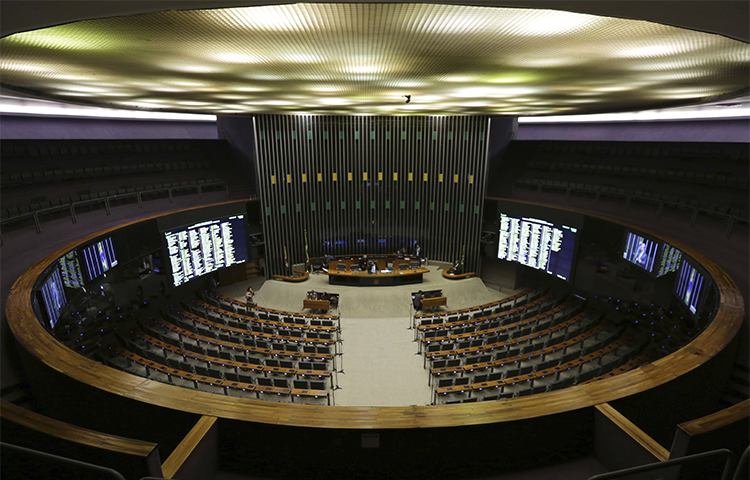The release of a private conversation between a well-known journalist and his source has shaken the journalistic community in Brazil and highlighted the increasingly polarized and uneasy terrain in which political reporters work.
The conversation between Reinaldo Azevedo, a right-wing columnist for Veja, the country’s influential weekly news magazine, and Andrea Neves, the sister of Aécio Neves, a senator and former presidential candidate for the centre-right PSDB party was recorded by police as part of a corruption investigation. It took place on April 13, five weeks before Andrea Neves was arrested as part of the Car Wash operation, a multi-billion dollar corruption scandal that has engulfed many of Brazil’s top businesses and most of its leading politicians.
BuzzFeed Brasil published the conversation last week after it was included in a package of what the newspaper Folha de S.Paulo said was more than 2,200 conversations released by the Supreme Court.
Azevedo is not under investigation and the transcript does not appear to contain information relevant to the inquiry, prompting many journalists to say they believe it was released solely to harm the writer, who has become more critical of the investigation in recent months.
A spokesperson for the Supreme Court told CPJ it would not comment until after an investigation, requested by Azevedo, is finished. The journalist did not respond to CPJ’s request for comment.
The case has sent a chill through newsrooms across Brazil and reporters have put aside their divisions to unite against what they see as a real threat.
“With great frequency, if not always, we consider [Azevedo’s] points of view repugnant,” said a piece co-authored by Glenn Greenwald in The Intercept. “It is hard to overestimate the extremism in his conservative positions. Needless to say, none of that matters right now. Disagreeing with a writer’s positions does not justify the publication of his private telephone calls by government investigators.”
Azevedo, who in the conversations with Neves appeared to call his own magazine’s critical reporting of her brother’s party “disgusting,” resigned hours after details of the conversation came to light.
In a farewell piece entitled, “My Last Post for Veja,” Azevedo said the release of his conversation “characterized a police state” and called it “an aggression against one of the guarantees of the profession…the secrecy of a conversation between a journalist and their source.”
In a response to BuzzFeed that he published online, Azevedo made a number of points, including:
- I am not being investigated.
- The transcript of a private conversation between a journalist and his source has no relation to the object of the investigation.
- Making this kind of conversation public is simply a way to intimidate journalists.
Journalists’ right to conduct private conversations is enshrined in Brazil’s constitution, with Claudio Lamachia, head of the country’s Bar Association, comparing it in interviews to attorney-client privilege enjoyed by lawyers and their clients.
The case is the most high-profile of several incidents in recent years that journalists and freedom of speech activists say has worried them.
In August last year a court in Brasilia ruled that investigators could obtain the confidential phone records of a journalist with the newsmagazine Época. The paper fought the ruling. [CPJ was unable to determine if its appeal was successful.] A court in São Paulo took a similar decision in 2016 in a case against a reporter with the newspaper, Folha de S. Paulo. The paper said in December that a judge revoked the order.
And in 2015, a court ordered the entire newsroom of the Diário da Região to turn over its phone records so police could try to identify the source of one reporter’s stories. The São Paulo paper got an injunction and the case has still to be decided by the Supreme Court, but the incident prompted staff there to review the way they work.
“We take more precautions now,” the reporter involved, Allan de Abreu, told CPJ. “We meet with sources personally when we can to avoid talking on the phone and we look for ways of communication that are less easily traced.”
“We all feel that the state is becoming more heavy-handed when its interests are threatened. And these heavy-handed actions against journalists are both very strong and very worrying.”
Such incidents come against a background of nationwide crisis. Left-wing president Dilma Rousseff was impeached last year and replaced by her opponent and former vice president Michel Temer. Temer himself has been caught on wire tapes appearing to condone the payment of hush money to a jailed legislator. [Temer said the recording was not proof of wrongdoing.]
In the vacuum, investigators, police and attorney generals have grown in stature but there are fears by many in Brazil that some of their actions–such as the release of the Azevedo tapes–are politically motivated to discredit opponents or other influential figures.
Two of the leading candidates for next year’s presidential election are also helping stoke the backlash against a press.
In recent months, Brazil’s media have reported how Jair Bolsonaro, a right-wing congressman abused journalists and opponents who challenge his statements, calling them illiterate and idiots and challenging them to one-on-one debates. And, Lula, the former president who hopes to run again for the Workers’ Party, has said that if elected he may take action to limit journalists’ power and even arrest those he claimed spread lies about him.
The already charged atmosphere was worsened by the Azevedo revelations, with the Brazilian Association of Investigative Journalism saying in a statement, “The investigation of a crime cannot serve as a pretext for the violation of the law, nor for the trampling of fundamental rights such as the protection of sources guaranteed in the constitution.”
“The fact that these cases are popping up is worrying,” Vinicius Mota, the managing editor of Folha de S. Paulo, one of Brazil’s biggest newspapers, told CPJ. “We hope that authorities will be diligent in separating out what is professional journalism and what is of interest to them.”
[Reporting from São Paulo]
